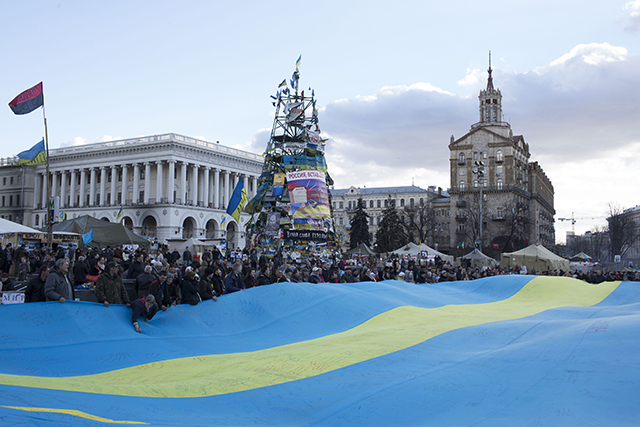Ukrainian Journalist: If Russians ‘Want to Start War, They Usually Do’
Alissa Tabirian /
Ukrainian journalist Mykola Vorobiov, warning of the consequences of Russian expansionism, said he is “not optimistic” about the potential for negotiations over Russia’s seizing of the Crimea region from Ukraine.
“If [the Russians] want to start the war, they usually do,” Vorobiov, chief editor of the Euro-Patrol outlet, said yesterday at The Heritage Foundation.
Vorobiov cited reports that Russian troops had occupied more than 190 Ukrainian military bases and that “over 100,000 soldiers are close to our [Ukrainian] border.” He added that “Ukraine is already surrounded” by elite Russian forces close to the eastern border with Russia and the northern border with Belarus.
Heritage foreign policy analysts Ariel Cohen and Luke Coffey echoed Vorobiov’s sentiments, noting the increase in Russian military spending as an indication of Russian President Vladimir Putin’s plans to expand his sphere of control.
“From the Russian point of view, it’s an expansion of Russian control of what they see as a strategically important Black Sea coast,” Cohen said. He warned that Russia may transition from “being a soft authoritarian country” to “hard authoritarian.”
Although Russia has cut social, education, and medical spending, Cohen said, it has announced that “up to $800 billion will be spent over 10 years for military modernization.”

Mykola Vorobiov gestures with his passport as Heritage’s Ariel Cohen listens. Photo: Alissa Tabirian
Since 2008, Coffey said, “European countries have reduced spending . . . by 30 percent collectively. During the same period, Russia has increased military spending by about 16 percent.”
>>> Related: If Russia Attacks: How U.S. Should Respond to Further Aggression Against Ukraine
The panelists recalled Russia’s war with Georgia over the separatist enclaves of South Ossetia and Abkhazia and speculated that after Crimea the autonomous territory of Transnistria on the Moldova-Ukraine border could be one of Russia’s next targets.
To deter Russian expansionism, Coffey called for “a more permanent presence of U.S. forces and NATO forces in central and eastern Europe.”
“I would like to see more [NATO] training exercises announced and planned with our central and eastern European partners,” Coffey said. Otherwise, he said, Putin “does what he knows he can get away with.”
This story was produced by The Foundry’s news team. Nothing here should be construed as necessarily reflecting the views of The Heritage Foundation.

